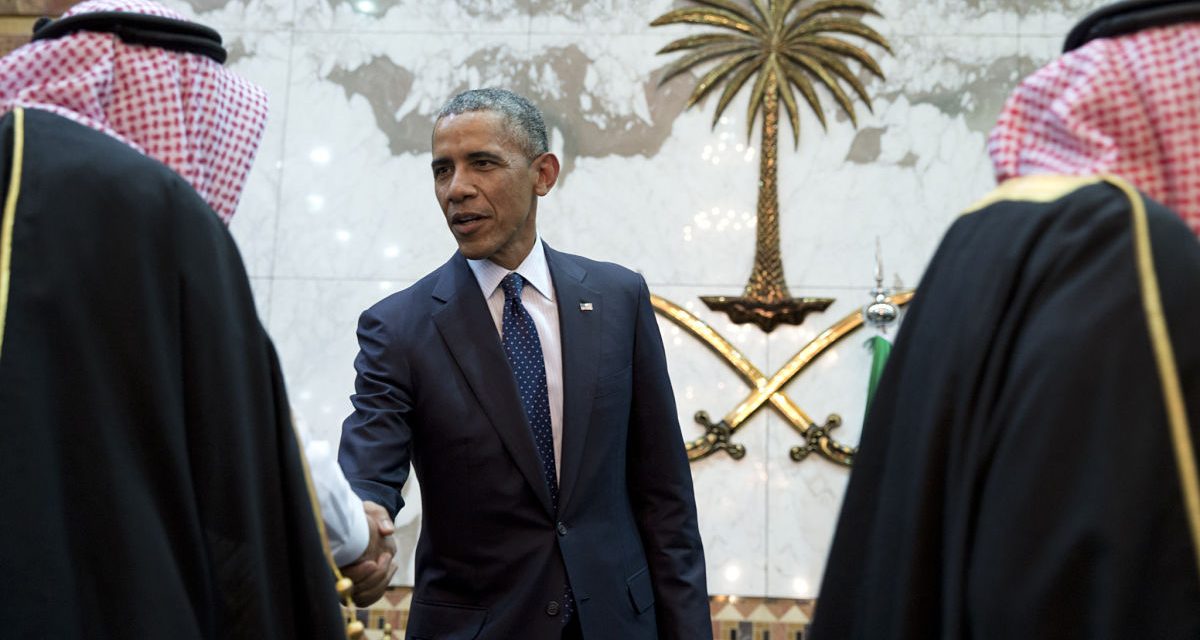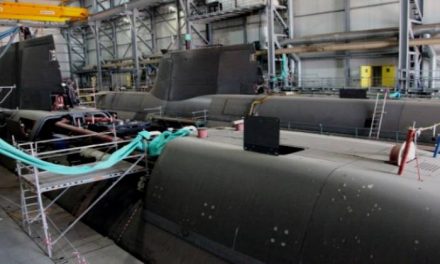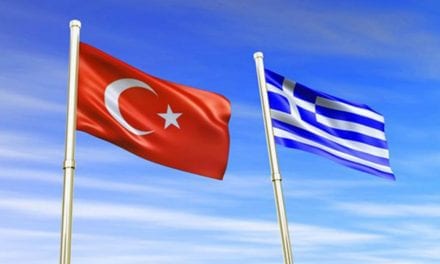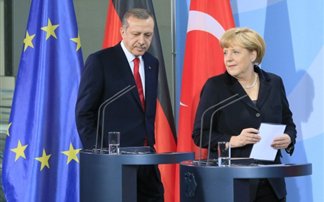President Barack Obama landed in Saudi Arabia on Wednesday as the U.S. alliance with the Mideast powerhouse, long lubricated by barrels of oil, is being questioned on both sides like never before.
Shortly after his arrival at King Khalid International Airport, where he was greeted by a small delegation led by the governor of Riyadh, Obama headed immediately to the Erga Palace in the capital for discussions with King Salman, the 80-year-old monarch he hopes he can convince to take a stepped-up role battling ISIS.
The leaders exchanged pleasantries during a brief photo opportunity at the start of the meeting, which was expected to last a little more than one hour. Through a translator, Salman told Obama that he was “very pleased” to host him in the kingdom, while the American leader told the monarch that he was grateful for his hospitality.
But even amid the cordiality, the kisses that then-President George W. Bush exchanged with the kingdom’s ruler a decade ago are a thing of the past. The Saudis have little confidence in Obama’s commitment to their security and fear he’s shifting U.S. attentions to its rival, Iran; Obama has described the Saudis as “so-called allies” and has complained their policies fuel anti-U.S. terror and regional chaos.
READ: Obama looks for allies’ support on ISIS as ties and nerves fray
In the U.S. Congress, a growing drumbeat of criticism about Saudi Arabia is finding expression in efforts to restrict arms sales to Riyadh, expose alleged Saudi involvement in the September 11 terror attacks and allow it to be sued for that day’s destruction and death.
The clamor coincides with increasing domestic energy resources that lessen the U.S. need for foreign oil. Moreover, the allies are divided by a slew of issues including the approach to the wars in Syria and Yemen, the Iranian nuclear deal and the influence Tehran wields in Iraq.
These regional issues are topping Obama’s agenda during his visit this week as he looks for backing for the fight against ISIS in Syria and Iraq. And they are dynamics that are set to persist and color the U.S.-Saudi relationship for the next occupant of the Oval Office as well.
An unhappy marriage
For all the friction and diverging interests, though, analysts and former officials say the two countries aren’t at the end of a love affair so much as in an unhappy marriage in which both sides, for better or worse, are stuck with each other.
“Despite all these differences, Saudi Arabia and America are not getting divorced,” said Bruce Riedel, director of the Intelligence Project at the Brookings Institution and a former CIA official. “We need each other.”
Fawaz Gerges, a professor studying Islamic-Western relations at the London School of Economics, called it “an estrangement” that wouldn’t end U.S. involvement in the Middle East.
As unlikely as the union between a rigidly conservative Islamic monarchy with a questionable human rights record and a secular democratic republic may seem, neither will be able to cut the ties the bind them.
The two countries are bound by military links and sales, a shared fight against terrorism, the need to leverage each other’s diplomatic clout and, for the U.S., the necessity of ensuring that world oil supplies flow freely.
READ: Cheap oil isn’t Saudi Arabia’s only big risk
Economic and energy links
Though the U.S. imports fewer barrels of Saudi crude and petroleum than it did on the day of Obama’s first inauguration, the energy needs of its allies — particularly in Asia — are crucial to global and U.S. economic health.
“U.S. energy independence doesn’t really change the equation that much because of the global strategic importance of the oil supplies,” said Hussein Ibish, a senior resident scholar at the Arab Gulf States Institute in Washington.
Saudi Arabia also carries diplomatic weight in the region that the U.S. has used to serve its interests.
The “Saudis are such an influential actor in the Middle East and broader Muslim world that no secretary of state or president has truly wanted to go it without them,” said David Weinberg, a Saudi Arabia expert at the Foundation for the Defense of Democracies.
As the Arab Spring has devolved into chaotic violence, Saudi Arabia has provided funds that have stabilized key U.S. allies, including Egypt, Bahrain and Jordan, and it has developed stronger ties with one of its longtime enemies, Israel, the closest U.S. ally in the region.
READ: Yemen ceasefire goes into effect
War on Terror: Offering Arab cover
On the most kinetic level, the two countries are linked by counterterrorism efforts that will go on for years.
It was reported in 2013 that the U.S. operates an unacknowledged drone base out of Saudi Arabia and is relying on the country to fight al Qaeda in the Arabian Peninsula, the Yemen-based group that the Obama administration has called the most serious threat to the American homeland.
Separately, the U.S. “needs Saudi Arabia to provide Arab cover for the American-led coalition fighting the Islamic State in Iraq and Syria,” said David Ottaway, a Wilson Center expert on the kingdom. “The overall U.S. war on terrorism in the Middle East cannot be won without Saudi help.”
The militaries of both countries are linked in nuts-and-bolts ways, too. Saudi Arabia “is by far the world’s largest purchaser of U.S. weaponry,” said Nawaf Obaid, a visiting fellow at Harvard University who estimated that it has is over $100 billion worth of equipment on order from U.S. defense contractors.
READ: McConnell, Ryan decline to back 9/11 lawsuit bill
Not only does that translate into jobs for U.S. workers, but the equipment also comes with support from the Pentagon in the form of training that creates deep ties between the two militaries.
The Saudis, for all their frustration with the U.S., “just don’t have alternatives to the U.S.,” said Ibish. “They can talk about Europe and China and Russia all they like, but in the end, its military is structured around the United States and only the United States can provide the leadership they’re looking for.”
READ: Nine Guantanamo detainees transferred to Saudi Arabia
Uncertain times for the House of Saud
The tensions are compounding an already uncertain time for the House of Saud. A transition in 2015 introduced a new and largely untested group of leaders at a time when the falling price of oil has saddled Saudi Arabia with its first budget deficits.
And it has embarked on a protracted war in Yemen that is earning it U.S. condemnation even though the Saudis see themselves as shouldering their region’s security challenges just as the White House has asked.
Saudi Arabia, feeling threatened by the overthrow of a friendly government on its border, has intervened against the Iran-backed Houthi rebels while also trying to strike al Qaeda there.
“Obama was encouraging them to take responsibility for their own security and that’s what the Saudis are doing,” Ottaway said. “But when your allies decide they’re going to act on their own, they don’t necessarily do what you want them to do.”
The administration has quietly criticized the humanitarian cost of the Yemen conflict, for which it is providing intelligence, weapons and ammunition as the region’s strongest al Qaeda affiliate exploits the conflict.
“Al Qaeda’s most dangerous branch is seeing this Saudi-led war as a godsend,” Weinberg said. “That’s something the Saudis haven’t treated as a priority.”



















